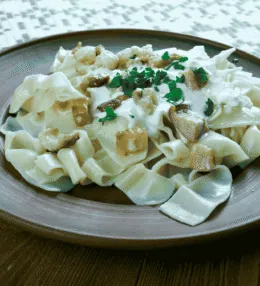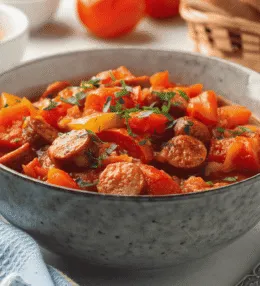
- View
Table of Contents
ToggleKanom Jeen Nam Ya is a traditional Thai dish that brings together delicate rice noodles with a flavourful fish curry sauce, creating a combination of tastes that is both comforting and vibrant.
Known for its light yet deeply aromatic qualities, Kanom Jeen Nam Ya is a dish that captures the essence of Thai cuisine, balancing spices, herbs, and fresh ingredients to create a meal that feels both familiar and exciting. It’s a popular street food in Thailand, often enjoyed as a quick meal or shared during family gatherings.
Want to dive deeper into Thai Cuisine? Don’t miss our post on 36 Traditional Thai Foods To Try
What Is Kanom Jeen Nam Ya?
Kanom Jeen Nam Ya is a dish that consists of thin, fermented rice noodles, known as kanom jeen, served with a rich fish curry sauce, nam ya. The noodles are soft and slightly tangy from fermentation, offering a delicate base for the flavourful sauce.
The curry itself is made by blending fish with coconut milk, fresh herbs, and spices, resulting in a sauce that is creamy yet fragrant with the punch of Thai aromatics. It’s typically served with an array of fresh vegetables and herbs, which diners can mix into the dish to create their own perfect bite.
The balance of flavours is key here. The rich, savoury curry is contrasted by the freshness of raw vegetables like cucumbers, bean sprouts, and Thai basil, while the rice noodles add a smooth, subtle backdrop. The result is a dish that’s satisfying without being heavy, making it perfect for a midday meal or a light dinner.
Ingredients and Taste
The primary ingredients in Kanom Jeen Nam Ya revolve around fresh and flavourful staples of Thai cuisine. The fish, often mackerel or catfish, is simmered and blended into a smooth curry sauce with coconut milk, creating a rich and creamy base. Thai aromatics like lemongrass, kaffir lime leaves, and galangal are key to the dish’s distinctive flavour, infusing the sauce with bright and earthy notes.
Red curry paste, made from a mixture of dried chilies, garlic, and shallots, brings heat and depth to the dish. The fermented rice noodles provide a unique texture and flavour, slightly tangy and soft, which complements the bold curry sauce.
Fresh vegetables like green beans, cabbage, and Thai eggplant are served on the side, along with fragrant herbs such as cilantro and mint, allowing diners to balance the richness of the curry with crunchy, refreshing bites. The combination of textures and tastes makes Kanom Jeen Nam Ya a dish that’s both complex and harmonious, rich yet light, spicy yet fresh.
A Taste of History
Kanom Jeen Nam Ya is steeped in Thai culinary history, with its roots tracing back to the ancient rice noodle-making traditions of Southeast Asia. The fermentation process used to make kanom jeen dates back centuries, as the technique was developed to preserve rice and create noodles that have a unique tangy flavour.
Over time, this noodle dish evolved into a beloved meal across Thailand, with different regions adding their own variations to the fish curry sauce. In southern Thailand, the curry tends to be spicier, reflecting the region’s love for bold flavours, while in central Thailand, the dish is often milder and creamier.
The versatility of Kanom Jeen Nam Ya has allowed it to remain a popular dish throughout the country, enjoyed at street stalls, family gatherings, and even religious festivals. It’s a dish that speaks to the heart of Thai culture, where food is not just sustenance but a way to connect with others and celebrate the vibrant flavours of the land.

Thai Kanom Jeen Nam Ya (Rice Noodles with Fish Curry Sauce)
Ingredients
- 400 g white fish fillets catfish, tilapia, or any firm white fish
- 1 cup coconut milk
- 2 tbsp red curry paste
- 1 tbsp fish sauce
- 1 tbsp palm sugar or brown sugar
- 3 kaffir lime leaves torn
- 2 lemongrass stalks bruised
- 2 tbsp vegetable oil
- 1/2 cup chicken or fish broth
- 1 small onion finely chopped
- 2 cloves garlic minced
- 1- inch piece galangal or ginger sliced
- 500 g fresh rice noodles or dried, cooked according to package instructions
- Fresh herbs cilantro, Thai basil, and mint
- 1 cucumber sliced
- 1/2 cup bean sprouts
- 2 boiled eggs halved
- Lime wedges
Instructions
- To begin, prepare the fish by boiling it in a small pot of water for 5-7 minutes until fully cooked. Once done, remove the fish, drain any excess water, and let it cool slightly. Using a fork, flake the fish into small pieces, ensuring no bones remain. Set aside for later use.
- In a large pan, heat 2 tablespoons of vegetable oil over medium heat. Add the finely chopped onion, minced garlic, and sliced galangal or ginger. Sauté for 3-4 minutes until the onion becomes soft and translucent, releasing its fragrance.
- Next, stir in the red curry paste and continue to sauté for an additional 2 minutes. This step helps to bring out the deeper flavours of the curry paste. Add the bruised lemongrass and torn kaffir lime leaves for extra aromatic depth.
- Slowly pour in the coconut milk, stirring constantly to blend the curry paste with the milk. Add the chicken or fish broth to create a smooth sauce. Bring the mixture to a simmer and let it cook for 5 minutes to allow the flavors to meld.
- Add the flaked fish to the curry sauce, followed by the fish sauce and palm sugar. Stir to combine everything, and let it simmer for another 5-7 minutes. Taste the sauce and adjust seasoning as needed, adding more fish sauce for saltiness or sugar for sweetness.
- While the curry simmers, prepare the rice noodles. If using fresh noodles, briefly steam or blanch them in boiling water to soften. If using dried noodles, cook according to package instructions, then drain and rinse under cold water to stop the cooking process. Set the noodles aside.
- Remove the lemongrass and kaffir lime leaves from the sauce before serving. Plate the rice noodles in individual bowls, and generously ladle the fish curry sauce over the top.
- Garnish each bowl with fresh herbs, bean sprouts, cucumber slices, and halved boiled eggs. Serve with lime wedges on the side to add a burst of citrus flavour. Enjoy your Kanom Jeen Nam Ya with extra fresh vegetables or a side of Thai chili paste for added heat!
Nutrition
You May Also Like










